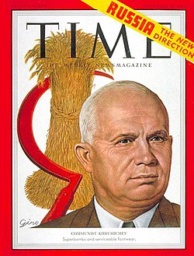

Speech to 20th Congress of the C.P.S.U. (1956)
by Nikita Khrushchev


Even after the end of the war a Congress was not convened for over seven years. Central Committee Plenums were hardly ever called. It should be sufficient to mention that during all the years of the Patriotic War not a single Central Committee Plenum took place. It is true that there was an attempt to call a Central Committee Plenum in October 1941, when Central Committee members from the whole country were called to Moscow. They waited two days for the opening of the Plenum, but in vain. Stalin did not even want to meet and talk to the Central Committee members. This fact shows how demoralized Stalin was in the first months of the war and how haughtily and disdainfully he treated the Central Committee members. In practice, Stalin ignored the norms of Party life and trampled on the Leninist principle of collective Party leadership. Stalin's willfulness vis a vis the Party and its Central Committee became fully evident after the 17th Party Congress, which took place in 1934. Having at its disposal numerous data showing brutal willfulness toward Party cadres, the Central Committee has created a Party commission under the control of the Central Committee's Presidium. It has been charged with investigating what made possible mass repressions against the majority of the Central Committee members and candidates elected at the 17th Congress of the All-Union Communist Party.🏁
Global Leaderboard
| # | Player | Time | Duration | Accuracy | WPM | pp | |
|---|---|---|---|---|---|---|---|
| 1 | |||||||
| 2 | |||||||
| 3 | |||||||
| 4 | |||||||
| 5 | |||||||
| 6 | |||||||
| 7 | |||||||
| 8 | |||||||
| 9 | |||||||
| 10 |


Even after the end of the war a Congress was not convened for over seven years. Central Committee Plenums were hardly ever called. It should be sufficient to mention that during all the years of the Patriotic War not a single Central Committee Plenum took place. It is true that there was an attempt to call a Central Committee Plenum in October 1941, when Central Committee members from the whole country were called to Moscow. They waited two days for the opening of the Plenum, but in vain. Stalin did not even want to meet and talk to the Central Committee members. This fact shows how demoralized Stalin was in the first months of the war and how haughtily and disdainfully he treated the Central Committee members. In practice, Stalin ignored the norms of Party life and trampled on the Leninist principle of collective Party leadership. Stalin's willfulness vis a vis the Party and its Central Committee became fully evident after the 17th Party Congress, which took place in 1934. Having at its disposal numerous data showing brutal willfulness toward Party cadres, the Central Committee has created a Party commission under the control of the Central Committee's Presidium. It has been charged with investigating what made possible mass repressions against the majority of the Central Committee members and candidates elected at the 17th Congress of the All-Union Communist Party.🏁